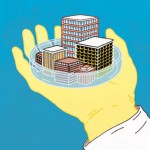 The rise of the information technology industry has seen the emergence of a number of key tech hubs across the United States. A recent paper from Harvard Business School identifies six major tech centers: San Diego, Denver, Seattle, Boston, Austin, and, of course, San Francisco.
The rise of the information technology industry has seen the emergence of a number of key tech hubs across the United States. A recent paper from Harvard Business School identifies six major tech centers: San Diego, Denver, Seattle, Boston, Austin, and, of course, San Francisco.
These hubs bring considerable benefits to these regions, but they can also siphon off talent from other parts of the country, including some of the biggest cities in the country.
“Astoundingly, five of the six most valuable public companies in the world in 2020 were tech companies headquartered in San Francisco or Seattle. In response, local policy initiatives to boost innovation abound,” the researchers explain.
Winner takes all
The researchers explored all filings from the US Patent and Trademark Office from 1976 to 2020, with a particular focus on so-called utility patents, which they define as new or improved useful products that give the inventor exclusive commercial rights for a period of up to 20 years. Such rights require the patent to have at least one US inventor.
They found a considerable spike in software-related patents in recent years, as whereas they accounted for just 2.5% of patents in the 1970s, this had mushroomed to 50% by 2015.
“During that period of time, you had the rise of the personal computer, you had the rise of 3G, of the internet,” the authors explain. “You had a couple of wars, you had a great recession, you had 9/11. There’s been lots and lots of things that have hit that world. And [software has] only continued to rise up.”
Tech hubs
Equally important, however, has been the rise of the tech hubs. The researchers explain that large cities have always tended to benefit from the agglomeration effect, and so would have more patents on a per capita basis than smaller towns and cities. Interestingly, however, much of the growth in the tech centers came from big cities.
What’s more, this growth doesn’t appear to be driven by established firms moving locations, but instead by new businesses that have risen to the top, such as Microsoft and Apple. These centers have also benefited from being able to tap into global talent like never before.
The researchers point out that tech hubs are not just powerful in terms of software-related patents, as they have also seen an increase in non-software patents. The hubs grew to contribute 23% of all non-software patents, which is up from 11% at the start of the study period. For instance, the authors cite the way software can help in the development of vaccines and other medicines.
Peak clusters?
Despite the growing inventive power of the clusters, the paper reminds us that the five largest metro areas have largely remained prosperous and continue to play a key role in a range of sectors, such as New York and financial services.
This has prompted the authors to suggest that the clusters might have reached the peak of their powers. That’s not to say that they’ll vanish, of course, but merely that our frictionless world makes location less powerful than perhaps it was, which will undermine the power clusters have over innovation.
“If you’re trying to create a global-dominating consumer internet kind of play, then, well, you’re probably going to have to move to one of the big tech clusters like San Francisco,” the researchers explain. “Likewise, if you are a biotech entrepreneur, there are enormous advantages to being in the Boston area. But there are also a lot of inventors who work in spaces that give them more geographic flexibility.”
This raises the prospect of companies being just as successful by locating in far less expensive areas and using technologies such as crowdsourcing or gig worker platforms to tap into the talent they need from around the world, while giving salaried employees a better quality of life in a lower-cost region.
“The craziness that says ‘I must be a part of Silicon Valley’ is perhaps now one that may mean you can take regular trips and attend industry conferences,” they conclude. “But you don’t necessarily have to rush to create your own lab in the Valley or in the Boston area.”